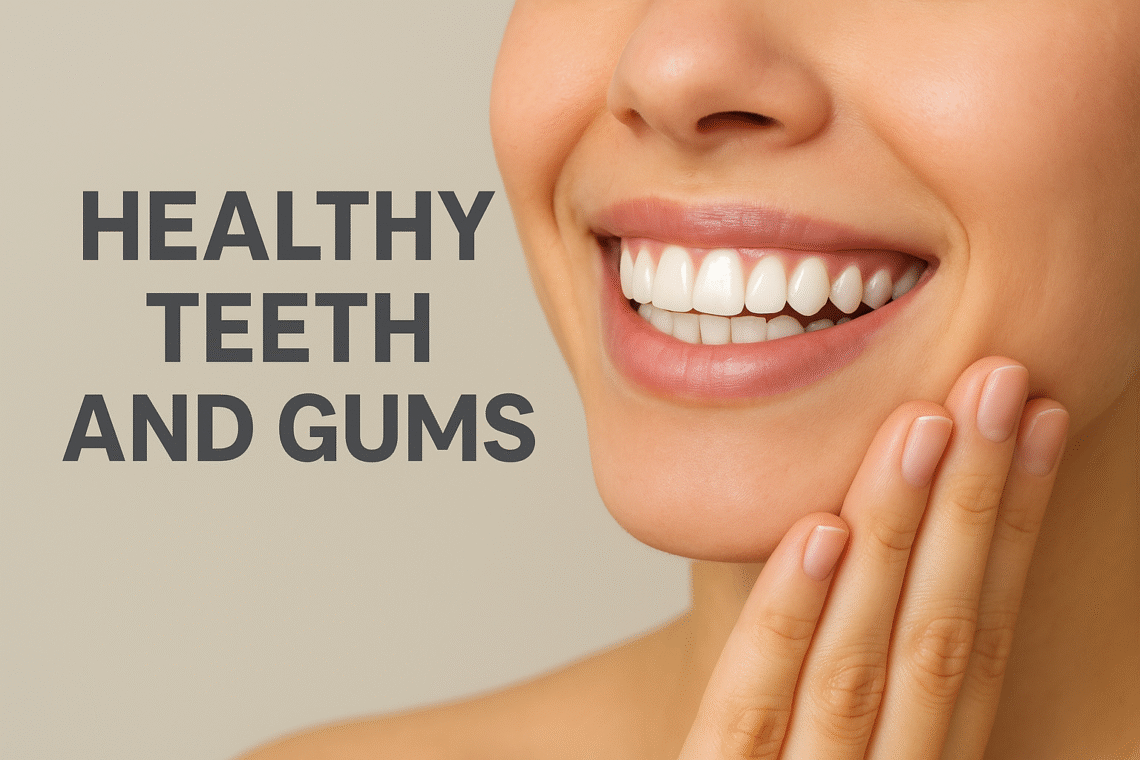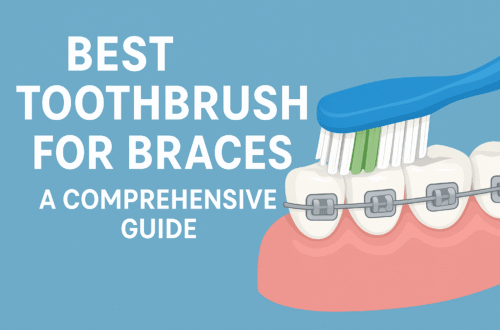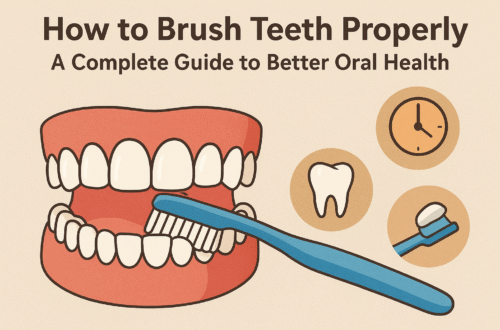Affiliate Disclaimer:
Some of the links on this website are affiliate links, which means that if you click on a link and make a purchase, we may earn a commission at no extra cost to you. This helps support the website and allows us to continue creating content. We only recommend products or services we personally use or genuinely believe will add value to our readers.
A bright smile is more than just a sign of beauty — it’s a reflection of overall health. Maintaining healthy teeth and gums plays a vital role not only in oral hygiene but also in preventing systemic issues such as heart disease, diabetes, and inflammation. The good news: with the right habits and care, you can keep your mouth healthy for life.
Why Oral Health Matters
Most people think of oral care as a way to keep their teeth white and breath fresh — but the health of your mouth is deeply connected to the health of your entire body. In fact, many doctors now view the mouth as a “mirror” that reflects overall wellness. Problems that start in the mouth can often signal, contribute to, or worsen health issues elsewhere.
The Mouth–Body Connection
Your mouth is home to over 700 species of bacteria, most of which are harmless or even beneficial. However, when plaque and tartar accumulate, harmful bacteria multiply and can enter the bloodstream through tiny openings in inflamed gum tissue. Once inside the body, these bacteria — along with the inflammatory chemicals they trigger — can travel to organs and affect vital systems.
This process explains why oral health and systemic health are so closely intertwined. Maintaining clean teeth and healthy gums doesn’t just protect your smile — it can also reduce the risk of chronic disease.
1. Heart Health and Gum Disease
Research shows a strong link between periodontal (gum) disease and cardiovascular problems, such as heart attacks and strokes. The bacteria from infected gums can cause inflammation in blood vessels, encouraging plaque buildup and restricting blood flow. People with untreated gum disease are up to two times more likely to develop heart disease.
Keeping gums healthy through proper brushing, flossing, and regular cleanings can significantly lower this risk.
2. The Diabetes Connection
Diabetes and gum disease influence each other in a two-way relationship. High blood sugar levels feed harmful oral bacteria, making infections more likely and healing slower. At the same time, gum inflammation can make it harder to control blood glucose levels.
People with diabetes should be especially diligent about oral hygiene — maintaining healthy gums can help stabilize blood sugar and improve overall diabetic management.
3. Oral Health and Respiratory Conditions
When bacteria from the mouth are inhaled into the lungs, they can cause or worsen respiratory issues such as pneumonia, bronchitis, and chronic obstructive pulmonary disease (COPD). Elderly adults and those with weakened immune systems are particularly at risk. Regular dental care and cleanings help reduce the bacterial load and protect lung health.
4. Impact on Pregnancy
Oral health plays a crucial role during pregnancy. Studies suggest that severe gum disease may be linked to premature birth and low birth weight. Hormonal changes during pregnancy can make gums more sensitive and prone to inflammation — so maintaining proper hygiene and visiting a dentist for gentle cleanings is highly recommended for expectant mothers.
5. Brain and Cognitive Health
Emerging research indicates that chronic gum infections may also be connected to cognitive decline and Alzheimer’s disease. Bacteria such as Porphyromonas gingivalis have been found in the brains of Alzheimer’s patients, suggesting that long-term oral infections might contribute to neuroinflammation. While research is ongoing, it underscores how far-reaching oral health truly is.
The Bigger Picture: Oral Health as Preventive Medicine
Taking care of your mouth is a simple yet powerful form of preventive healthcare. Regular brushing, flossing, and professional cleanings can protect against inflammation, infection, and systemic diseases that cost far more to treat later.
In short, your mouth is not separate from your body — it’s the starting point of your overall wellbeing. When you nurture your oral health, you’re investing in a healthier heart, brain, and body for years to come.
Essential Habits for Healthy Teeth and Gums
1. Brush the Right Way
Use a soft-bristled toothbrush and fluoride toothpaste. Brush twice a day for at least two minutes, using gentle circular motions to clean all surfaces — front, back, and chewing surfaces. Don’t forget your tongue, where bacteria can also accumulate.
2. Floss Daily
Flossing removes food and plaque between teeth where brushes can’t reach. It’s one of the simplest yet most effective ways to prevent cavities and gum disease.
3. Eat a Balanced Diet
A diet rich in fruits, vegetables, lean proteins, and dairy supports strong enamel and healthy gums. Limit sugary snacks and acidic drinks, as these can erode tooth enamel and feed bacteria.
4. Stay Hydrated
Water helps wash away food particles and neutralize acids in the mouth. Fluoridated water also strengthens enamel and prevents tooth decay.
5. Regular Dental Checkups
Visit your dentist at least twice a year for cleanings and exams. Professional cleaning removes tartar buildup, and early detection can prevent minor issues from becoming major problems.
Natural Ways to Support Oral Health
While daily brushing, flossing, and regular dental visits form the foundation of good oral hygiene, a number of natural remedies and lifestyle habits can provide extra support for healthy teeth and gums. These holistic approaches help balance your mouth’s microbiome, reduce inflammation, and strengthen enamel naturally.
1. Oil Pulling
An ancient Ayurvedic practice, oil pulling involves swishing a tablespoon of oil — typically coconut, sesame, or sunflower oil — in your mouth for 10–20 minutes before spitting it out. Coconut oil is especially popular because it contains lauric acid, known for its antibacterial and anti-inflammatory properties.
Regular oil pulling may help:
- Reduce harmful oral bacteria
- Decrease plaque buildup
- Freshen breath naturally
It’s best done in the morning before brushing your teeth.
2. Green Tea for Gum Health
Green tea is rich in polyphenols, which are powerful antioxidants that can help reduce inflammation and inhibit bacterial growth in the mouth. Studies have shown that people who drink green tea regularly often have healthier gums and less bleeding. You can also use cooled green tea as a natural mouth rinse.
3. Chewing Sugar-Free Gum
Chewing sugar-free gum, particularly those containing xylitol, can stimulate saliva production — your body’s natural defense against acid and bacteria. Saliva helps neutralize harmful acids after meals and remineralizes tooth enamel. Xylitol also directly inhibits Streptococcus mutans, one of the bacteria responsible for cavities.
4. Aloe Vera for Soothing Gums
Aloe vera has anti-inflammatory and antibacterial effects, making it a gentle remedy for irritated gums. You can use aloe vera gel (from a trusted source) as a natural mouth rinse or apply a small amount directly to inflamed areas to soothe discomfort.
5. Crunchy Fruits and Vegetables
Crisp, water-rich foods like apples, carrots, and celery help naturally clean your teeth and stimulate saliva flow. They also act as gentle “toothbrushes” that scrub away surface plaque and massage the gums.
6. Essential Oils
Certain essential oils, such as tea tree, peppermint, and clove oil, have natural antibacterial and anti-inflammatory properties. Diluted properly, they can be added to homemade mouth rinses or used in toothpaste for an added antimicrobial boost.
(Always ensure proper dilution and avoid swallowing essential oils.)
7. Vitamin and Mineral Support
Strong teeth depend on the right nutrients. Make sure your diet includes:
- Calcium and phosphorus – for enamel strength (found in dairy, fish, nuts)
- Vitamin D – helps your body absorb calcium effectively
- Vitamin C – essential for gum health and tissue repair
- Magnesium and zinc – for bone density and immune support
If your diet lacks these nutrients, supplements can help, but consult your dentist or doctor first.
Signs of Gum Problems You Shouldn’t Ignore
Your gums play a crucial role in protecting the roots of your teeth and the bone that supports them. When gum tissue becomes irritated or infected, it can lead to inflammation, tooth loss, and even systemic health problems if left untreated. Recognizing early warning signs allows you to take action before the damage becomes permanent.
Here are some of the most common symptoms that indicate your gums may need extra care or professional attention:
1. Red, Swollen, or Tender Gums
Healthy gums are firm, pale pink, and fit snugly around your teeth. If they appear red, puffy, or feel sore when touched, this can signal early-stage gingivitis — inflammation often caused by plaque buildup. Left unchecked, it can progress to periodontitis, a more serious form of gum disease that damages bone and tissue.
2. Bleeding When Brushing or Flossing
A little bleeding might seem harmless, but it’s often one of the first visible signs of gum disease. Gums that bleed easily indicate inflammation or infection beneath the surface. Don’t stop flossing out of fear of bleeding — instead, improve your oral hygiene routine and schedule a dental cleaning to remove plaque and tartar.
3. Persistent Bad Breath (Halitosis)
Chronic bad breath is more than just unpleasant — it’s often caused by bacteria trapped below the gum line. When food particles and plaque accumulate, they release sulfur compounds that lead to odor. Regular cleaning and professional scaling can help eliminate the root cause rather than just masking the smell.
4. Receding Gums
If your teeth look longer than they used to, you may be experiencing gum recession. This happens when the gum tissue pulls away from the tooth, exposing sensitive roots. Receding gums can result from aggressive brushing, misaligned teeth, or periodontal disease. If left untreated, the exposed roots can lead to tooth sensitivity, decay, and even tooth loss.
5. Tooth Sensitivity
Sensitivity to hot, cold, or sweet foods often indicates that the protective gum layer has receded or that enamel is thinning. This can expose the dentin (the softer layer beneath enamel) or tooth roots, both of which are more reactive to temperature changes. Using toothpaste designed for sensitive teeth can help temporarily — but identifying and treating the underlying cause is key.
6. Loose or Shifting Teeth
Gum disease weakens the bone structure that anchors your teeth. If your teeth feel loose, change position slightly, or your bite feels “off,” this could be a sign that the supporting bone tissue is deteriorating. Seek immediate dental care, as early intervention can often save affected teeth.
7. Changes in Gum Texture or Color
Gums that develop white patches, dark spots, or a shiny surface may be signaling irritation, infection, or even precancerous changes. Any unexplained alteration in color or texture should be examined by a dentist to rule out serious conditions.
When to See a Dentist
If you experience one or more of these symptoms for more than a few days, it’s important to schedule a dental checkup. Early treatment can often reverse mild gum disease and prevent permanent damage. Your dentist may recommend a professional cleaning, scaling, or deeper root planing to remove bacteria below the gum line.
The Bottom Line
Healthy gums are just as important as healthy teeth — they provide the foundation for your entire smile. Paying attention to subtle changes in gum color, texture, or comfort can help you catch problems early and maintain long-term oral health.
Final Thoughts
Caring for your teeth and gums is one of the most important investments you can make in your health. A consistent oral care routine, smart dietary choices, and regular dental checkups not only protect your smile but also support your entire body’s wellbeing.
Healthy teeth and gums aren’t just about appearance — they’re the foundation of a long, healthy, and confident life.





